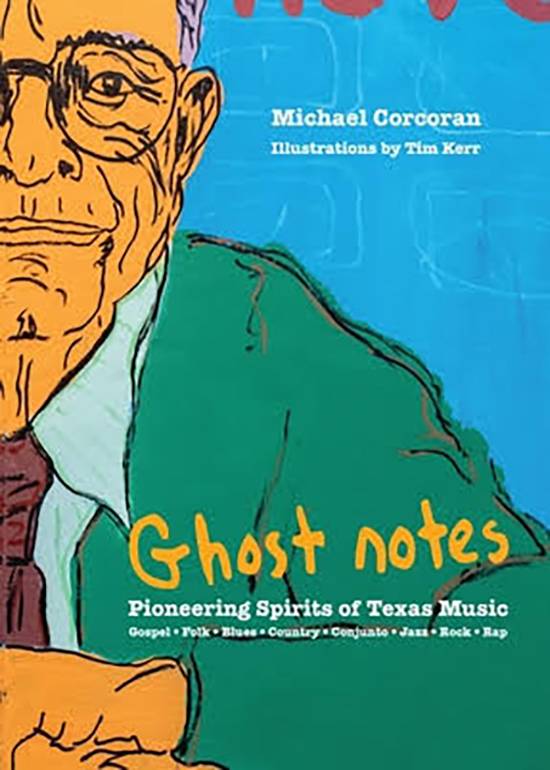Don’t Cross the Streams

[Ghost Notes]: Pioneering Spirits of Texas Music
by Michael Corcoran; illustrations by Tim Kerr.
Fort Worth: TCU Press, 2020.
150 pp. $32.50 Hardcover.
Reviewed by
Joe W. Specht
In his preface, author and journalist Michael Corcoran reflects on a personal visit in 2003 with acclaimed folk and blues researcher Mack McCormick at his Houston home. Here the folklorist offered sage advice on researching and writing about Texas music: “Forget the flashy and famous … Find the originators and tell their stories.” With [Ghost Notes]: Pioneering Spirits of Texas Music, Corcoran continues to do justice to McCormick’s dictum.
[Ghost Notes] is a continuation of the author’s well-received All Over the Map: True Heroes of Texas Music. This time he has enlisted artist Tim Kerr as collaborator, and the pairing is inspired. Kerr first made a name for himself on the 1980s Austin indie-punk scene in bands such as Bad Boys and Poison 13. More recently he has taken to specializing in painting portraits (usually acrylic on wood) of historical figures with an added illuminating quote or tidbit about the person.
In [Ghost Notes], Kerr conjures up a veritable rogues’ gallery of musicians, the originators if you will, who Corcoran has selected to profile. To better accommodate and display the full-color portraits (smaller pen-and-ink sketches are also featured), TCU Press has opted for a quarto-size (30 cm.) format. That’s Robert Neve, “the father of the recording console,” wrapped around the front and back cover.
As for the significance of the title, [Ghost Notes], the epigraph provides a cryptic clue (in Kerr’s recognizable hand-lettering style): “Ghost notes are barely audible and unseen, a wisp lingering around the beat, yet somehow driving the groove.” However, no explanation is given to clarify why the title is enclosed in brackets.
Corcoran continues to offer a caveat.
“Most of these chapters started as newspaper or magazine articles, where footnotes are not used … I’ve tried my best to retrace the research and cite sources … Getting the correct information amid conflicting accounts is an obsession with me, but as I wrote in the intro of this book’s prequel All Over the Map, this is history, not science.”
And, yet, footnotes are to history what repeatable experiments are to science: validation.
That said, with or without footnotes/sources, [Ghost Notes] finds Corcoran in fine form. The text is loaded with factual nuggets. For example, the spelling of “Roky” Erickson, the lead singer of the 13th Floor Elevators, combines the first two letters of his first name, Roger, and his middle name, Kynard. Corcoran has long been recognized, too, for his ability to turn-a-phrase. Jimmy Bowen, who produced numerous sessions for Frank Sinatra, Dean Martin, and Sammy Davis Jr. in Los Angeles, then moving to Nashville in the mid-1970s to take-over the reins of various record companies, “brought the Rat Pack mentality to the Hat Act reality.”
[Ghost Notes] is divided into five parts—Gospel, Folk and Country, Rhythm and Blues, Rock ’n’ Rap, and Moguls and Mentors (jazz and conjunto receive some ink here)—and further subdivided into chapters. Oddly missing is a list of suggested reading and recommended recordings. But there is a sizable index of personal names—although Ray Benson slips through the cracks; Zoot Sims is misspelled “Simms”—that becomes even more essential for accessing the myriad musicians and musical personalities Corcoran sprinkles throughout the narrative.
For example, Part 3: Rhythm and Blues focuses primarily on Amos Milburn and Charles Brown, unsung “architects of rock ‘n’ roll” and gay lovers. The cast of characters features Fats Domino, Ray Charles, Lola Ann Cullum, Don Albert, the boogie-woogie Thomas Family (brothers George Jr. and Hershel and sisters Beulah “Sippie” Wallace and Hociel Thomas), Pete Johnson, Albert Ammons, Meade Lux Lewis, Aubrey “Moon” Mullican, Sam “Lightnin’” Hopkins, and Hattie Burleson. Corcoran’s wide-ranging perspective further highlights the fluidity, the unruly nature of the music, never content to be neatly pigeonholed.
Corcoran rounds things up with “Bonus Track: A Dozen More Worth a Deep Dive,” briefly touting twelve other originals, including Charline Arthur, Hop Wilson, and Maryjohn Wilkin. And he chooses to conclude with Kerr’s portrait of Fort Worth-born jazz giant Ornette Coleman and accompanying quotation. Here Kerr, or rather Coleman, is literally allowed the last word, a reflection of sorts on Corcoran’s approach to chronicling the musical mosaic of the Lone Star State: “I find that labels are the worst thing in the world for artistic expression.”
Joe W. Specht is director of Jay-Rollins Library emeritus at McMurry University. He is the author of Abilene in Song: The Women There Don’t You Mean (Rev. expanded ed., Texas Star Trading Company, 2017) and co-editor of The Roots of Texas Music (Texas A&M UP, 2003) and Abilene Stories: From Then to Now (Abilene Christian UP, 2013).
